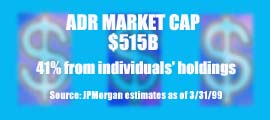|
Going global via ADRs
|
 |
September 8, 1999: 1:36 p.m. ET
They're a way to take the headache and expense out of investing overseas
By Staff Writer Jeanne Sahadi
|
NEW YORK (CNNfn) - If you love Greek olives, chances are you'll skip the flight to Athens in favor of a trip to the local gourmet store.
Likewise, if you want to invest in a non-U.S. company, there is no need to pack your bags or convert your cash to buy stock.
Take telecoms, for example. You are a seasoned investor in domestic Bells big and small, but now you want to diversify your portfolio by taking it global. Or maybe you just happen to notice that everyone is whipping out their Nokia (NOK) and Ericsson (ERICY) cell phones.
It won't take long to realize the rules regulating direct investment on exchanges overseas can be complicated -- and costly.
The ABCs of ADRs
Enter American depositary receipts, or ADRs, which represent shares of a non-U.S. company that have been deposited with a U.S. bank.
They trade in the United States like any other security and are often listed on one of the major stock exchanges. At the end of June, 314 common and preferred ADRs were listed on the New York Stock Exchange alone.
ADRs, which often represent blue chip firms and are issued to raise capital or broaden a company's investor base, can be bought and sold in U.S. dollars from a broker or through one of the online investment services provided by the depositary banks. Such banks include J.P. Morgan, Bank of New York and Citibank.

A receipt may be worth multiple shares in a company or a fraction of a share depending on which best "Americanizes" the price -- that is, sets the ADR price in a range comparable to that of shares of other U.S. securities in the same industry.
"No one here's going to come out with a 75-cent share. People would think you're in bankruptcy," said Ken Lopian, ADR Group division manager for the Bank of New York.
Save on costs and headaches
To realize the benefits of investing in ADRs, consider the alternative.
For one thing, some countries flat out prohibit or severely restrict outsiders from investing on their exchanges.
But even if they don't, there are often regulations, tax considerations and unfamiliar market practices that could cost you more in time and money than you're willing to invest.
When you buy an ADR, those obstacles are greatly reduced.

For starters, the depositary banks serve as stock transfer agent and perform several helpful functions. These include converting dividends into U.S. dollars, and distributing a company's annual report as well as materials on rights and exchange offers.
Information will be sent to you directly from the banks only if you bought your ADRs through them -- and if you do so, you should be aware that they only sell ADRs from those companies that are their clients. Otherwise any company material will go through your broker first.
Some depositary banks even make provisions for those shareholders who purchased ADRs directly from them to cast their proxy votes over the Internet.
The brokerage fees you pay are comparable to those for the purchase of any U.S. security, and if you buy an ADR from a depositary bank's online services, the fees are often comparable to what you would pay at a discount broker minus any commissions.
As for taxes, investors pay capital gains on ADRs just as they would regular U.S. securities. But when it comes to dividends, the tax you pay may be a bit higher than usual -- at least initially.
That is because many countries impose withholding restrictions that can be quite high. So instead of getting a gross payment on your dividend, a portion is withheld and treated as an international tax.

But you can get that money back in one of two ways. Either you may claim it as a credit on your U.S. tax return, or the bank that sponsors the ADR will act as an intermediary to reclaim the withheld portion from the country in question.
At J.P. Morgan, for instance, they have established an automated reclaiming process in countries where it is permitted so that you get your money back simultaneously with the dividend payment.
Another benefit of ADR investing is simply a matter of time. If you buy or sell ADRs within the U.S. market, you will be guaranteed a settlement date of three business days after a trade order is placed just as you would with an ordinary U.S. security.
Be prepared for a little more risk
So what's the catch?
In addition to the ordinary market risk inherent in any stock purchase, there is an "information risk," Morningstar equities editor Haywood Kelly and others said.
Lots of companies abroad do not report their earnings on a quarterly basis, but instead just once or twice a year.
Transparency is less a problem for those ADRs that list on the major exchanges because they are required to follow what are known in the United States as generally accepted accounting principles (GAAP) and must file documents with the Securities and Exchange Commission in keeping with U.S. disclosure requirements.

The same does not hold for companies whose ADRs trade over-the-counter, however. They submit their financials to the SEC only as frequently as they do to their home country, and they are not subject to GAAP or other U.S. standards of transparency.
"Information really starts to get bad when you go to OTC companies," Kelly said. "Be aware that if something goes bad you may not hear about it for six months." He noted, however, that big OTC companies such as Nestle of Switzerland often prove the exception.
But Kelly added that regardless of whether or not a company is listed, there is likely to be less analyst coverage for even the biggest ADRs than there is for most U.S. companies.
Currency fluctuations also pose a risk, experts said. A stronger dollar may cause the ADR price to decline, and a devaluation in an emerging market could wreak havoc with your investment because it is a negative indication not only of the economic health of a country but the investment potential of the firms that operate within it.
ADR vs. home market
On the other hand, it is often true that the market for a company's ADRs is more liquid than the market in the home country, as is the case with Latin American firms such as Telefonos de Mexico (TMX), where about 80 percent of all trades in the company take place in the ADR market, a J.P. Morgan spokesman said.
The reasons for the flight to Wall Street range from perceived instability in the home country to the imposition of a steep financial transaction tax on the purchase and sale of equities on the local exchange.
Such factors can siphon business from home bourses. Trade in Venezuelan ADRs, for instance, accounts for more than 90 percent of the total trade in Venezuelan businesses, said Leopoldo Guzman, president of the securities firm Guzman & Company.
Arm yourself with information
If you accept the risks and decide you're game anyway, be sure to dig up as much information as you can on the companies you are interested in, Morningstar's Kelly advised.
The financial press, which not only covers company news but the ADR market as a whole, is one good source. So, too, are the Web sites of the firms themselves, as well as the depositary banks' ADR sites.
You might also check to see if the company has an investor relations office in the United States. If so, Kelly said, call to request the company's latest annual report and form 20F, a registration statement that is filed annually with the SEC and provides detailed financial disclosure.
And it wouldn't hurt to brush up on the latest news affecting the region in which the ADR firm operates as well as the sector it represents.
"In part driven by global consolidation, we (are likely) to see more and more sector analysis and less and less country-specific investing," said Kurt Schneiber, global managing director of Citibank's depositary receipt services.
Should you or shouldn't you?
If you are still weighing the pros and cons of ADRs, experts recommend you consider several factors. Among them:
- Your investment objectives -- specifically whether ADRs contribute productively to your portfolio;
- The amount of money you have to invest; and
- Your comfort level with the added risks.
Of course, if you own a mutual fund that has international holdings, you may already have a stake in ADRs and not even know it, unless you are diligent about reading your fund's annual report. Some institutional investors are either restricted from investing directly in another country's securities or find it too costly to do so, so they opt for depositary receipts.
Some advisers say you should have a total portfolio worth no less than $100,000 if you plan to pick individual stocks from non U.S. companies, although certified financial planner Mark Groesbeck said that minimum is best applied to investors seeking direct investment in companies abroad.
But to hear certified financial planner Scott Buttfield tell it, if you're dealing with anything less than a $3 million account, then you should stay away from ADRs.
For true international diversification, your best bet in his view are mutual funds targeted toward global investment.
"It doesn't make any sense for the individual to reinvent the wheel," said Buttfield, who cautioned that "the brokerage community is out there hawking what's hot."
If $3 million seems a bit rich for your circumstances and you still are intrigued, there are many who say in an ever-shrinking global marketplace, ADRs provide an easy, efficient and inexpensive way for knowledgeable investors to augment a portfolio and take part in the growth of strong firms.
"Some of the best companies overseas trade in ADRs," Morningstar's Kelly said. "There's no reason to just invest in companies in the U.S. if there are great companies abroad." 
|
|
|
|
|
 |

|

